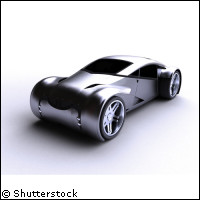Intelligent logistics put 'five-day car' within reach
With the European automotive industry under threat from countries with cheap labour, an EU-funded project is working on a paradigm leap: from Henry Ford's model of mass production to the radical concept of the 'Five-day car'. At present, European car manufacturers have the capacity to make far more cars than people want to buy: 22 million versus 15 million according to estimates. Industry insiders are asking whether the mass production of huge numbers of near-identical vehicles really is the best model for the 21st century. Instead of churning out vast numbers of cars in the hope that people will buy them, industry and academia have been exploring the 'Five-day car' concept of custom-made cars as part of the Intelligent Logistics for Innovative Product Technologies (ILIPT) project. 'The only way to ensure the economic survival of organisations, establishments and employees in the European automotive industry is to escape, in the long run, the competitive pressure from cheap labour countries,' says Rene Esser, the coordinator of the ILIPT project from ThyssenKrupp Automotive. 'ILIPT tackles both the conceptual and the practical aspects of the automotive industry's radical new concept: the delivery to the customer of a bespoke vehicle only several days after placing the order.' As a four year project running until 2008, the ILIPT initiative has put in place engineering and organisational solutions that could revolutionise the industry. The first is the concept of the 'modular car'. Rather than following the traditional practice of manufacturing the body of the car in a single 'monocoque' steel shell, ILIPT has been examining how to build a car from a number of standard, preformed modules. Novel materials, innovative joining technologies and new manufacturing methods could lead to a big reduction in stock costs. So far, ILIPT has settled on a design for a modular concept car and has started crash tests on a digital mock-up. Naturally, making a car in five days requires more than a modular design. The automotive industry is a complex network of independent but often poorly coordinated suppliers and assemblers. ILIPT has therefore developed collaborative processes for planning demand, capacity and replenishment among all the members of a supply chain and also for ordering and supplying components. The partners are creating standard data models and system interfaces to ease the free flow of information up and down the chain. The third theme has been the development of methods to pull all this together and assess and validate innovative concepts in product and process design, as well as order processing. The 'ILIPT Demonstrator' is a software package that shows how ILIPT could be applied in practice and includes several case studies arising out of the project. The demonstrator is one of the main means of disseminating the results of ILIPT, and was on display at a series of road shows during the summer of 2007. If all goes well, the innovations coming out of the ILIPT project could translate into new products by 2015. 'The initiative's true breakthrough is the realisation of a stockless vehicle supply system in Europe to supply a customer-ordered vehicle within five days,' Mr Esser says. 'It goes beyond the industry's usual response of shutting down assembly plants or increasing production capacity to capitalise on orders for popular models.' Mr Esser argues that the lessons learned in ILIPT will be applicable not just within the automotive industry, but to any of the manufacturing and transport sectors that are subject to similar pressures of time and cost. ILIPT's €16 million budget includes a €9 million funding injection from the EU's Sixth Framework Programme (FP6). The 27 partners in the project include such big name companies as Daimler, BMW and Siemens, as well as small and medium-sized enterprises (SMEs) and universities. They are based in nine EU countries plus Switzerland, Russia and Brazil.

